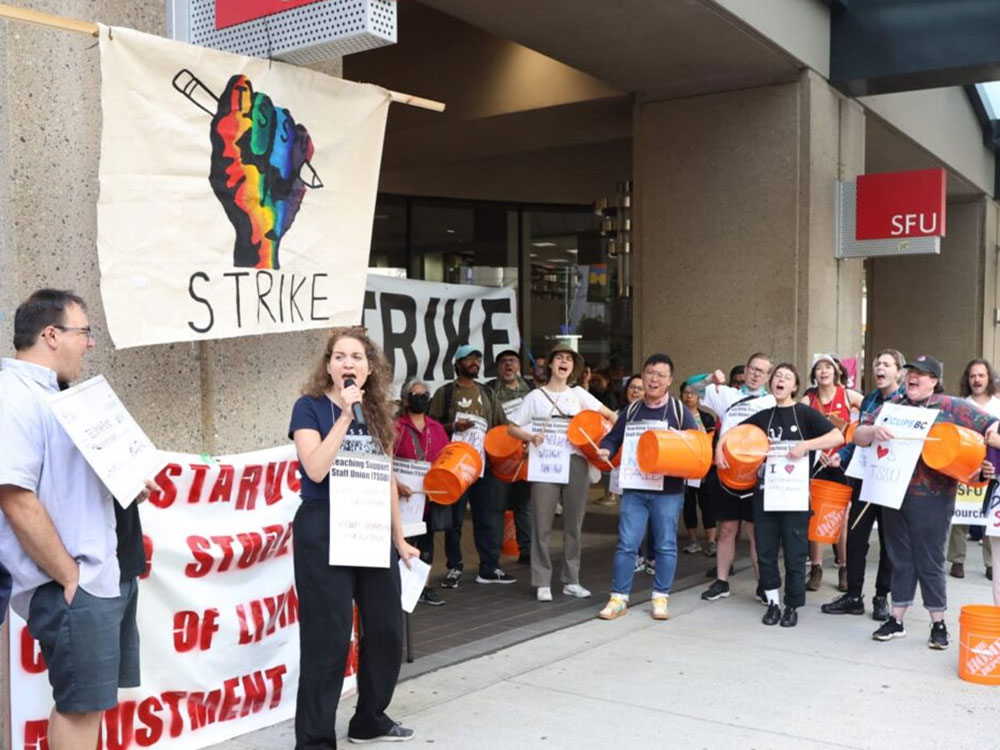Teaching assistants at Simon Fraser University are launching a full strike today that could disrupt classes for the school’s 37,000 students.
The Teaching Support Staff Union, or TSSU, says its approximately 1,600 members will stop reporting for work, and tutorials, labs and lectures led by those students will be suspended.
It also says it plans to begin rotating pickets of the university’s three campuses in the Lower Mainland.
Unions representing administrative and custodial staff have said previously they will not cross the TSSU picket lines.
The SFU Faculty Association executive says it is ultimately up to professors whether they work during the strike.
But the association says it has been working closely with the TSSU. It has announced its own office will be shut down and has instructed its members to not do any work normally done by TSSU members as long as the strike continues.
Amal Vincent, one of the union’s stewards, said the union plans to picket the Surrey campus, where the university’s board of governors are meeting, today.
Vincent said it will picket the SFU downtown Vancouver campus on Friday and will try to block its Burnaby campus on Tuesday.
Those pickets will rotate, Vincent said, until the union has a deal.
TSSU executive committee member Dalton Kamish said, “SFU is going to get shut down.”
“This is a fight for livelihood. A lot of our members are struggling,” Vincent said. “It is not about just the increase in wages. It’s also changing how people get paid so people get paid for the work that is being done.”
The union has been in a legal strike position since June, when it served notice to SFU president Joy Johnson in the middle of a graduation ceremony.
Its job action so far has been limited, consisting of a few small pickets as bargaining with the school continued.
Kamish said the union’s membership voted to escalate to a full strike if they didn’t reach a deal by Monday, their last day of scheduled bargaining with SFU.
They gave the school that ultimatum last week but did not reach a deal, Kamish said.
“They understand that while we appeal to the employer’s reason and sense of fairness, they only speak the language of force,” Kamish said.
The planned strike comes after negotiations in which the school and union have become stuck on issues of pay and pensions.
SFU says the teaching union has rejected the biggest monetary package it can offer under the provincial government’s current bargaining mandate, which was set last year.
The university has also questioned whether the union has the mandate for a strike, arguing many of its members did not cast ballots in a strike vote held this summer.
In a statement, SFU spokesperson Will Henderson said the administration offered to meet twice weekly until they could reach an agreement.
“The university is focused on resolving this situation as quickly as possible to ensure the academic success of our students, and support for our outstanding faculty and staff,” Henderson wrote in an emailed statement.
He made no comment about how the planned strike might affect classes for SFU students.
But in an emailed statement to students, the university warned classes and exams would likely be affected. It asks students to check with professors or supervisors if they will miss a class or test because of the strike.
Navleen Brar, vice-president of external and community affairs with the Simon Fraser Student Society, said many of her peers are divided on the strike. Students are upset, she said, that classes they paid for will be cancelled and postponed. But many also have sympathy for their teaching assistants, who Brar said were a “vital” part of the school.
“We want them to be back, and we want them back with a livable wage,” Brar said.
The announced strike is the culmination of nearly two years of frustrated bargaining and declining relations between SFU and the TSSU.
Their last agreement expired last year.
The union has asked for wage increases, Kamish said, that would amount to about $6 an hour for each worker, part of which is a cost-of-living adjustment. Kamish said the union bargains in dollar amounts, not percentages of existing salaries, because it wants to boost wages for its lowest-paid members.
The union also wants language to limit unpaid work, Kamish said, and wants pay to reflect the number of students in a class.
“Right now, you could be assigned a tutorial with five students in it or a tutorial with 500 students in it and they pay the same, and we think that’s clearly unfair,” Kamish said.
The union is also seeking more job security for sessional instructors, Kamish said, who work on short-term contracts without any promise of renewal. They also want pensions for those workers, Kamish added.
The school says it is constrained by the funding it receives from the provincial government.
In British Columbia, public sector institutions bargain under a shared mandate, meaning every union receives a roughly equal deal.
This year, that was a three-year agreement that included a raise of 3.24 per cent in the first year, plus a 0.25 per cent wage boost. The proposed wage gains were up to 6.75 per cent in the second year and 3.3 per cent in the third year, depending on the rate of inflation.
The TSSU is among the last public sector unions in the province that have not accepted a variation of that deal.
But Vincent said public institutions like SFU can find creative ways to increase compensation and improve benefits beyond the province’s mandate.
Kamish said the school had agreed to some changes, like an increase in mental health benefits, but hadn’t made progress on what Kamish considers key issues at the table.
“We’ve been in bargaining with the employer over 40 times and they’ve done little more than fix typos,” Kamish said.
The university says the TSSU is the one holding up negotiations. In an email to students, the school said it tabled an updated proposal last week that included movement on “key issues.”
“TSSU did not agree to the proposal and provided a counter-proposal that did not show movement on those key issues.”
The success of its strike could hinge on other unionized staff, who could refuse to cross the TSSU’s picket line but would lose wages and benefits for doing so.
The Canadian Union of Public Employees Local 3338, which represents 1,200 administrative and custodial staff at the school, has previously said its members would not cross a TSSU picket line.
The SFU Faculty Association executive, in an email to members last week, said a full strike was “a very real possibility” and told members they had the right to refuse to cross a picket line under school policy.
“Strikes can at times cause inconvenience and even friction,” said that email. “We would encourage you to remember that the TSSU is comprised of people who are both colleagues and students of faculty, and their choice to take job action arises from their own experiences with the university administration.”
The union and the school have a contentious relationship that goes beyond the stalemate at the bargaining table.
In 2019, the university agreed to voluntarily recognize nearly 2,000 research assistants as members of the TSSU. But it later reneged on that deal, saying it considered only about half of those members to be eligible.
The matter went to arbitration and the union has since launched a second unionization drive for those students.
One of the final bargaining sessions between the employer and the union was also abruptly cancelled last week.
The union says university representatives declined to enter the room because it was full of TSSU members who wanted to sit in on the negotiations, something the union explicitly allows.
The school said this violated the fire code, Kamish said.
Henderson said the parties mutually agreed to find a new venue, but Kamish said it was a unilateral move by the employer.
“They beg us to set bargaining dates and show up, and when we arrive, all we’re treated with is disrespect,” Kamish said. ![]()
Read more: Education, Labour + Industry

















Tyee Commenting Guidelines
Comments that violate guidelines risk being deleted, and violations may result in a temporary or permanent user ban. Maintain the spirit of good conversation to stay in the discussion and be patient with moderators. Comments are reviewed regularly but not in real time.
Do:
Do not: